The Promoter’s Paradox
Jack Carson and the Invention of the GWA Way
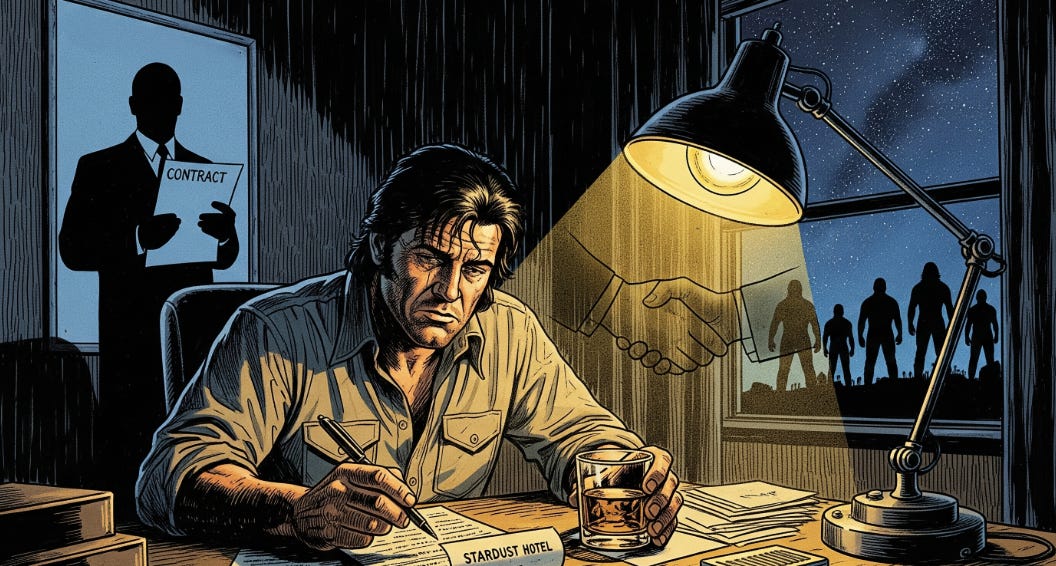
This story explores a speculative narrative inspired by historical wrestling events.
The air in the Las Vegas office still smelled like yesterday's stale cigarette smoke and Miguel Ramirez’s cologne. It was a ghost of a scent, a memory that hung in the oppressive, refrigerated air, mocking the desert heat outside. Jack Carson stared at the rental agreement on the polished desk, its stark, typed clauses a world away from the handshakes and shared bottles of tequila that had built the Great Western Wrestling Alliance. Outside, the neon of the Stardust buzzed, a relentless, indifferent promise of a future he no longer recognized. Inside, it felt like a wake.
“Let’s be clear, Jackie,” the casino manager said, his voice as smooth and empty as the polished marble floor. He leaned forward, dropping all pretense of condolence. “My deal for GWA High Noon was with Miguel, yes. But the deal was for Rio Grande Ramirez. The champion. He was the draw. He put respectable people in my casino seats, people who bought steak dinners and played the tables after the show. Without your main event, what am I buying? A wrestling promotion. I can get one of those anywhere. We need a new contract. And a new deposit. Let’s call it… a gesture of future confidence.”
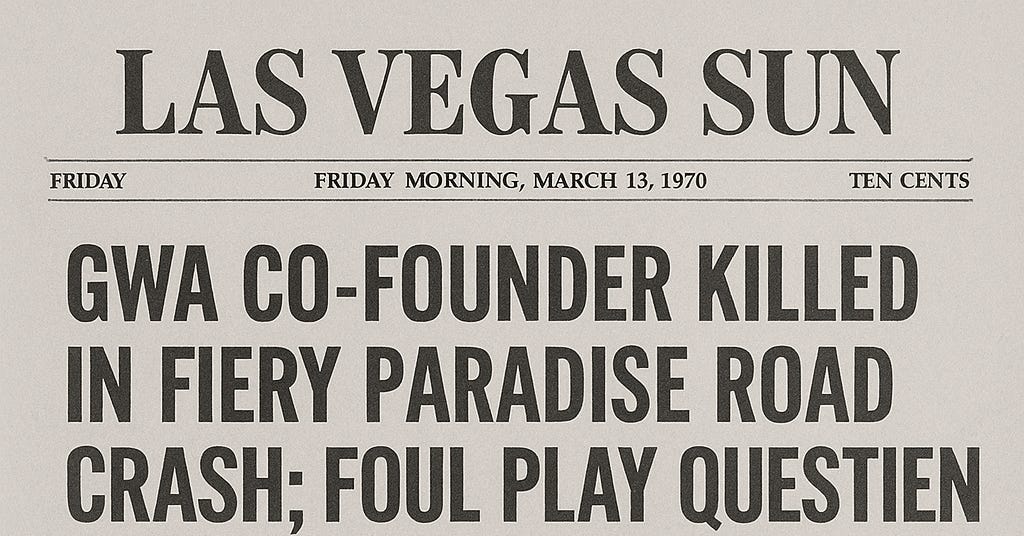
The gesture was worth more than the gate from their last three shows combined. This was the new reality, forged just days after Miguel’s car had gone off Paradise Road under the blackest of suspicions. The trust that had been the GWA’s currency was gone. But worse, the man who was both its heart and its top drawing star was gone, too. In his place were lawyers, liabilities, and a gaping hole at the top of the card. The language of predators.
Downstairs, in the tomb-quiet locker room, “Boxcar” Bo Bradley watched his oldest friend, and Dharma Bums tag team partner, through the doorway. He saw the slump in Carson’s shoulders, a weariness that went deeper than grief. Twenty years ago, they were kids with nothing but the rhythm of the rails beneath them and the wild, untamed promise of the West ahead. Bo had seen Jack turn a stolen can of beans and a good story into a feast for a dozen hungry men in a cold boxcar. He knew Jack was a poet, but he was also a survivor, a pragmatist forged in the harsh reality of the road. But this? This was different. These weren't carnival grifters you could outsmart. These were Vegas sharks, and they smelled blood.
Bo didn't doubt his friend's heart for a second. He doubted the math. It’s one thing to lose your partner. It’s another to lose your champion. The GWA had just lost both in a single, fiery crash. He’s got the soul for it, Bo thought, methodically taping his wrists, the familiar ritual a small anchor in the swirling chaos. But poetry doesn't pay off men like that, and it damn sure can't draw a house. They’ll bleed him dry.
That night, Carson didn’t sleep. In the sterile silence of his hotel room, surrounded by condolence cards and a stack of mounting bills, he pulled out a dog-eared, whiskey-stained copy of his own 1966 manifesto—a document of Beat-era ideals that now felt impossibly, painfully naive. He zeroed in on the lines he’d written with Miguel, words that now felt like a eulogy.
"Bread and roses for the tillers of our soil."
"Dignity for all, from the star to the stagehand."
How do you turn poetry into a payroll when your main attraction is gone? How do you make a revolution solvent?
He thought of Miguel’s funeral just days before. He remembered standing under the unforgiving Texas sun, watching Miguel’s nephew, the high-flying "El Aguila" Pedro Ramirez, do the unthinkable. In a profound act of grief that shattered decades of tradition, the young luchador had removed his mask at his uncle's graveside, letting the whole world see his tears. The weight of that moment, the crushing burden of legacy, felt suffocating. It was a burden Carson now shared, both for the man and for the champion.
He found his journal, the pages filled with his jagged scrawl, and wrote, the words pouring out like a confession.
March 16, 1970
Miguel is gone. The words are ash in my mouth. They say it was an accident, but the truth in this town is as bent as a back-alley dice game. He was the soul of this thing. And he was the star. Our handshake was the only contract we ever needed. That promise was enough. It was real. Now I’m surrounded by men who speak only in clauses and liabilities, men whose promises are written by other men in rooms I’ll never see. They want to put a fence around the horizon. They want to own the soul Miguel gave away for free. I won't let them. I can't.
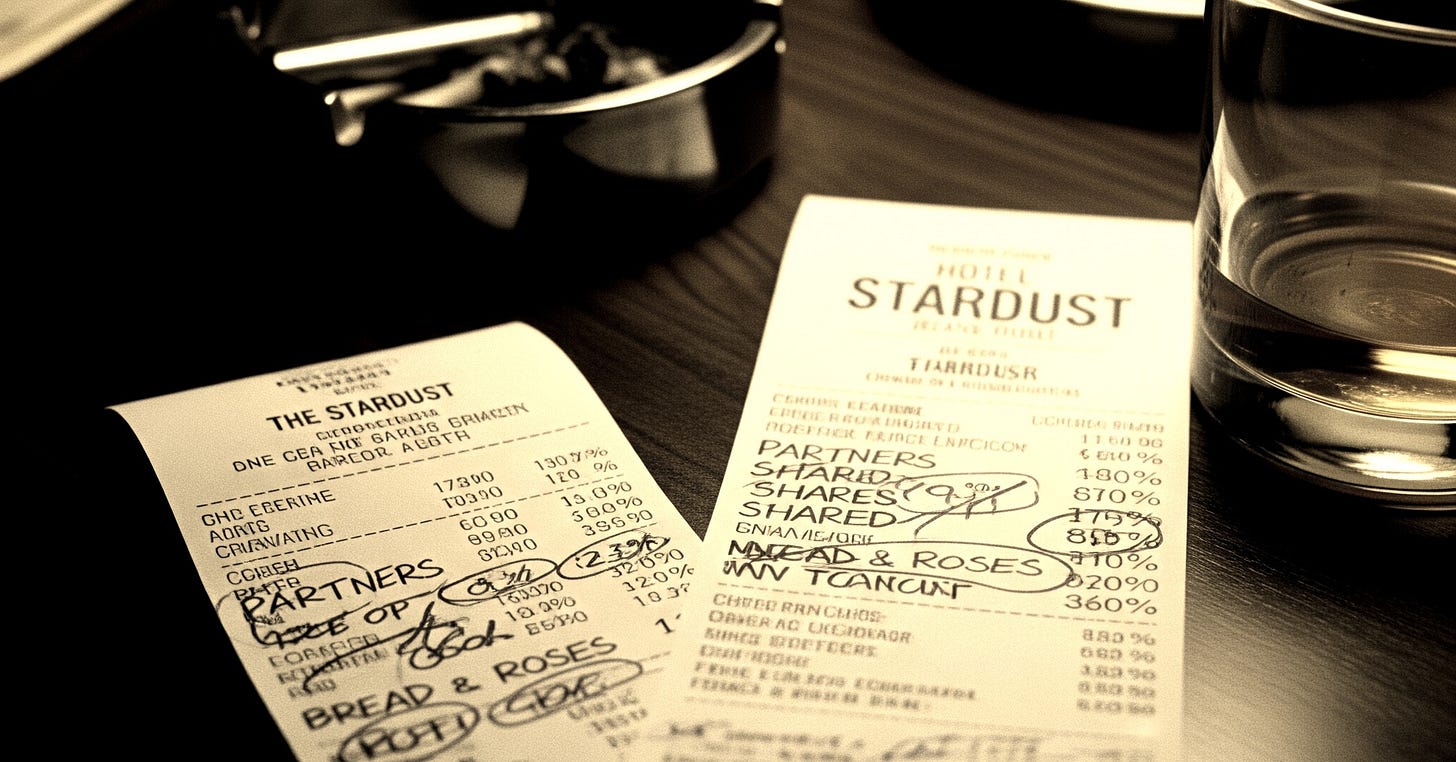
He put the journal down and picked up a hotel receipt. He began to scrawl on the back, drawing from his time in the military doing math on the fly calculating distances. He was trying to invent a system, a framework that could protect their vision from the very world they were now forced to inhabit. A system that was more than a handshake but less than the predatory contracts that had defined the business for decades. It wasn't just about money; it was about honoring a legacy. It was about creating a structure that couldn't die with one man.
The next week, Carson called a mandatory meeting. He stood before the wrestlers, not on a stage, but on the dirty, sweat-stained floor of the locker room. He looked exhausted, older.
“Miguel and I started this with nothing but trust,” he began, his voice raspy, the words catching in his throat. “That’s not enough anymore. The world we built that on… part of it died with him. So we have to build something new. Something stronger. From now on, this promotion belongs to all of us.”
He laid it out, his voice gaining strength with each word. A percentage of every show’s net profit—forty percent—would go directly into a talent pool, distributed based on a wrestler’s place on the card. And more than that, every wrestler would have the option to convert a portion of their earnings into actual shares of the company. Not a bonus. Not a gift. Ownership.
Bo listened, a familiar ache in his chest. It was the same beautiful, impossible, soul-stirring talk he’d heard from Jack under a million stars in some forgotten boxcar. It was the language of dreamers trying to conjure a new champion out of thin air with nothing but hope and percentages. And he knew, with the gut-deep certainty of a pragmatist, that it was going to get his friend crucified. The veterans would call it a scam. The sharks in the front office would call it weakness. It was too honest for a business built on illusion.
The first show under the new system felt different. The tension was still there, but it was electric, charged with a mix of hope and suspicion. In the ring, Bo found himself in a tag match with a new pairing of Jesse Hawkins and Tommy Tucker. He watched as Hawkins, a brawler whose first instinct was to make himself look like the toughest man in the ring, intentionally held back on a follow-up, creating space for the rookie Tucker, a more technical wrestler, to hit a complex, high-impact move. The sequence was seamless, and it got the crowd roaring. It wasn't about one man getting the spotlight; it was about making the match, and therefore the show, better. Because a bigger gate meant a bigger payout for everyone in the room. The logic was simple, brutal, and for the first time, collective.
After the final match, Carson gathered them again. He had a chalkboard, the kind you’d find in a one-room schoolhouse. On it, in his rough handwriting, were the night’s gate receipts, the venue expenses, and the net profit. He circled a number: the 40% talent pool. Then, he went down the list, calling out each wrestler's name and their share. The room was dead silent.
When he got to Bo, the figure was nearly double what he’d have expected for a mid-card tag match. Along with the cash, Carson’s assistant handed him a small, neatly typed slip of paper.
G.W.A. Share Acquisition Option: 1 Share.
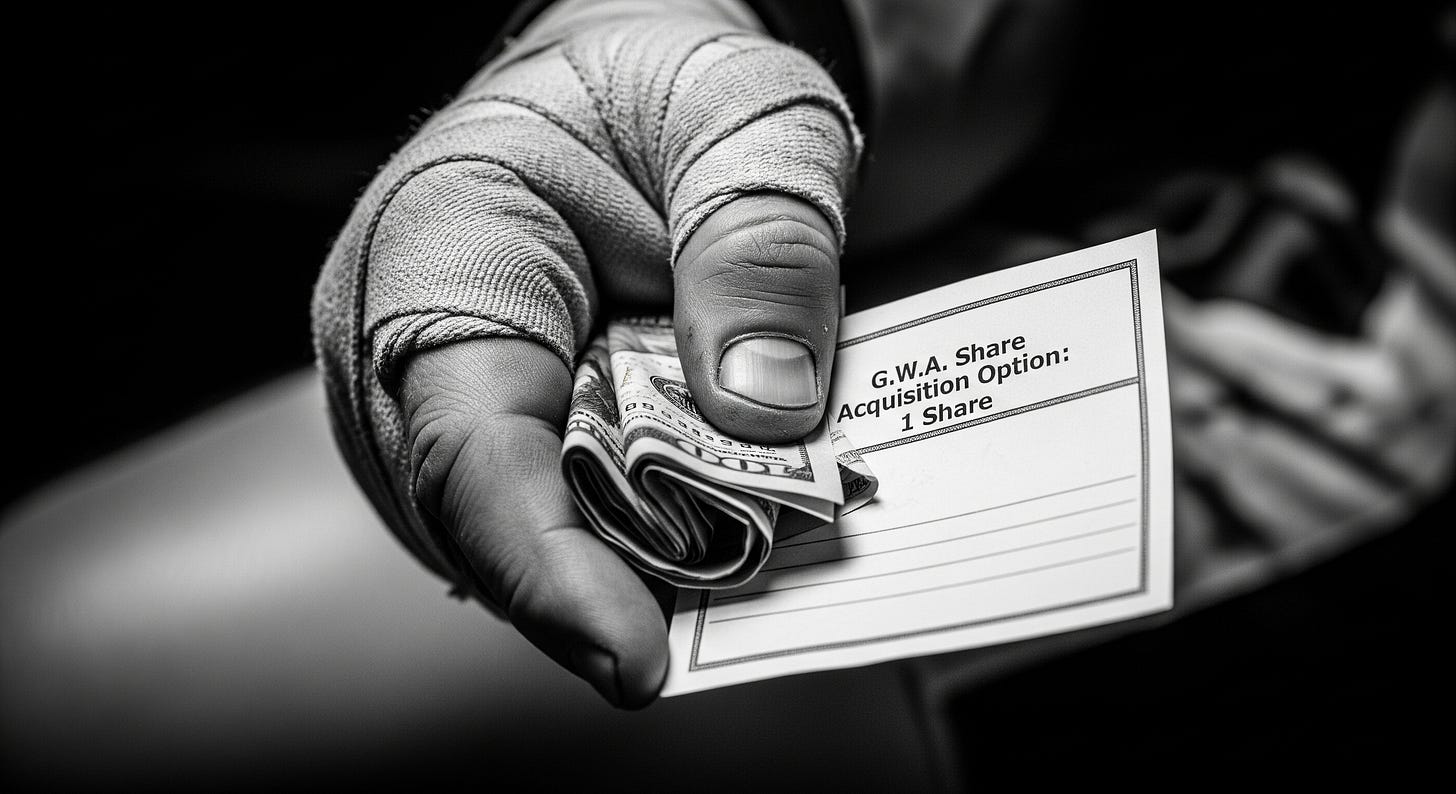
Bo stared at it. It wasn't a promise. It wasn't a bonus that could be rescinded. It was a legal option. It was real. He looked up at Carson, who simply winked, his eyes weary but clear. For the first time in weeks, Bo felt the cold knot of dread in his stomach loosen. The poet had found a way to make the numbers sing.
In the months that followed, the culture of the GWA locker room transformed. It wasn't a sudden conversion, but a slow, grinding shift from suspicion to a kind of guarded trust. The cutthroat competition for spots was replaced by a strange and powerful collaboration. Veterans like “Mountain Man” Mark Jensen, a man who had clawed his way to the top, began actively coaching younger talent. After a show in Denver, he was seen in the ring for nearly an hour, walking another rookie, Billy Thompson, through a sequence he’d messed up. He wasn't yelling; he was teaching. Why? Because the rookie getting better made the territory stronger, which made the gates bigger, which made his own shares more valuable. It was self-interest, but it was enlightened self-interest.
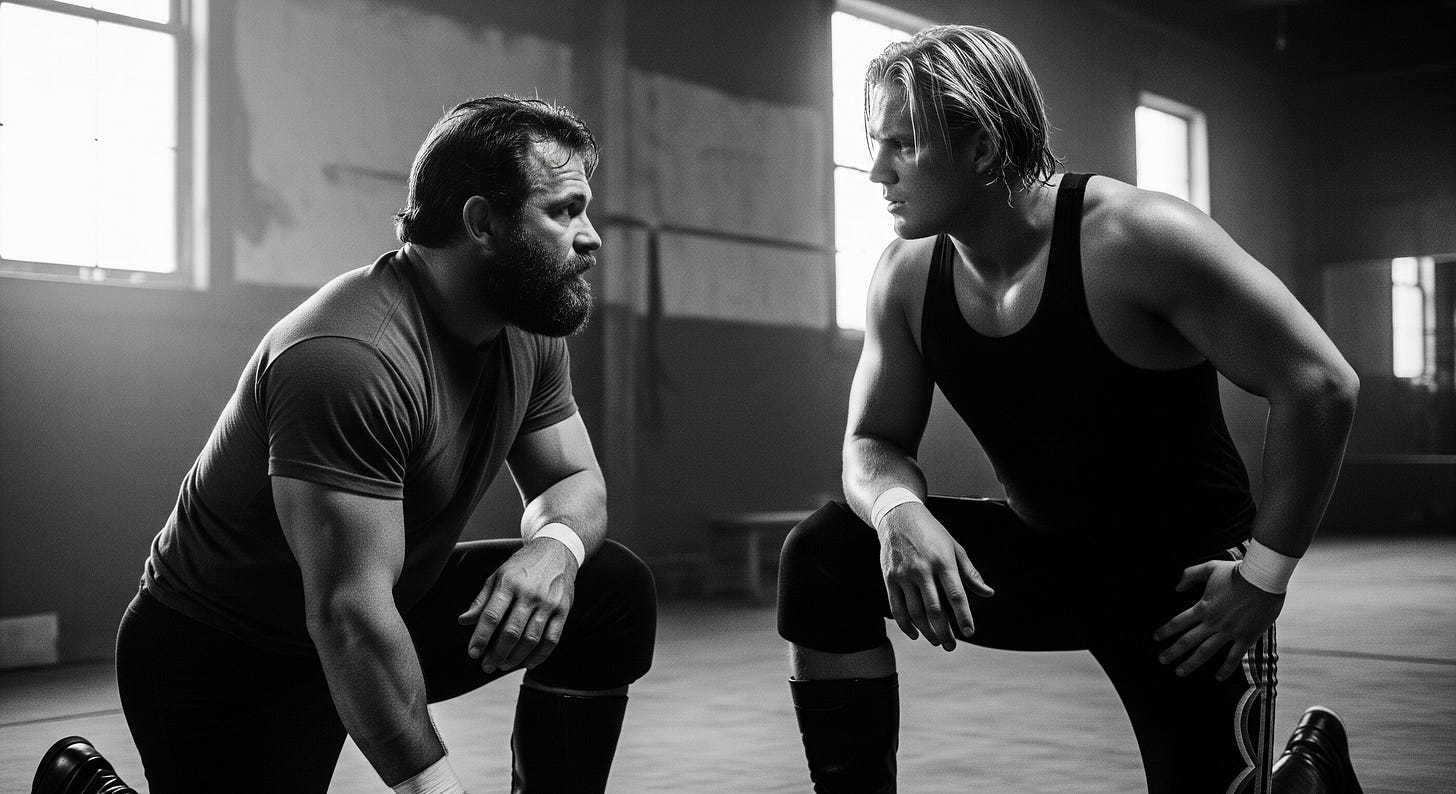
Carson formalized this new ethos in a memo distributed to the talent, an excerpt from what would become his internal guide on "Drawing Money":
“We're not here to change wrestling - we're here to perfect it. Every time you step in that ring, you're not just working a match - you're building the foundation of the GWA's future. Longevity in this business comes from building trust with your audience, and trust with the man standing across from you. We draw money by being authentic to who we are. And who we are, now, is partners.”
Nowhere was this more evident than with Hawkins and Tucker. Once they would have been bitter rivals competing for the same spot, now became wrestling’s most unlikely and innovative partnership. They were a study in contrasts—the brawler and the technician—but they trusted each other implicitly. They developed intricate double-team moves, born from hours in empty gyms and on the road, each man committed to elevating the other because they knew it elevated the Alliance. They were partners in the ring because they were now, in a very real sense, partners in the business.
The system had other, more profound effects. "Harlem Hurricane" James Washington, one of the first to embrace the stock option, used many of his dividends to fund youth wrestling programs in his community, embodying the GWA's commitment to giving back. "Desert Eagle" Eddie Martinez, having accumulated enough shares to gain voting rights, used his position at stakeholder meetings to champion the inclusion of more Hispanic talent and Lucha Libre traditions, enriching the product for everyone. Even the villainous Baron, B. Beauregard Blackthorn, incorporated his share ownership into his gimmick, turning a business reality into compelling kayfabe.
The GWA Way was never a perfect system. It was a messy, evolving response to a tragedy. It created new problems—jealousy over share percentages, heated debates in stakeholder meetings—but these were the problems of partners, not the problems of the exploited. It was the moment Jack Carson, faced with the death of his partner and his champion, refused to adopt the exploitative model of the past. Instead, he codified his principles into the very structure of the company.
Years later, looking back, Carson would write in his journal:
"The old carnival men thought the secret was in the con, that the money was in the lie. They were wrong. The secret is in the story, and the best stories are the ones where everyone has a reason to believe in the ending. We didn't give the boys a contract; we gave them a stake in the story. We made them authors. And it turns out, when everyone helps write the book, they work a hell of a lot harder to make sure it's a bestseller."
That was the GWA Way. It was more than a handshake, and it was so much more than a contract. It was a map.
The GWA Way was born from a crisis, a testament to a different path wrestling could have taken. This is just one of the countless stories buried in the territories, waiting to be told. To uncover the full history of wrestling's most principled promotion and explore the sagas of the men and women who lived it, subscribe to Wrestling Under Western Skies. The journey is just beginning.


